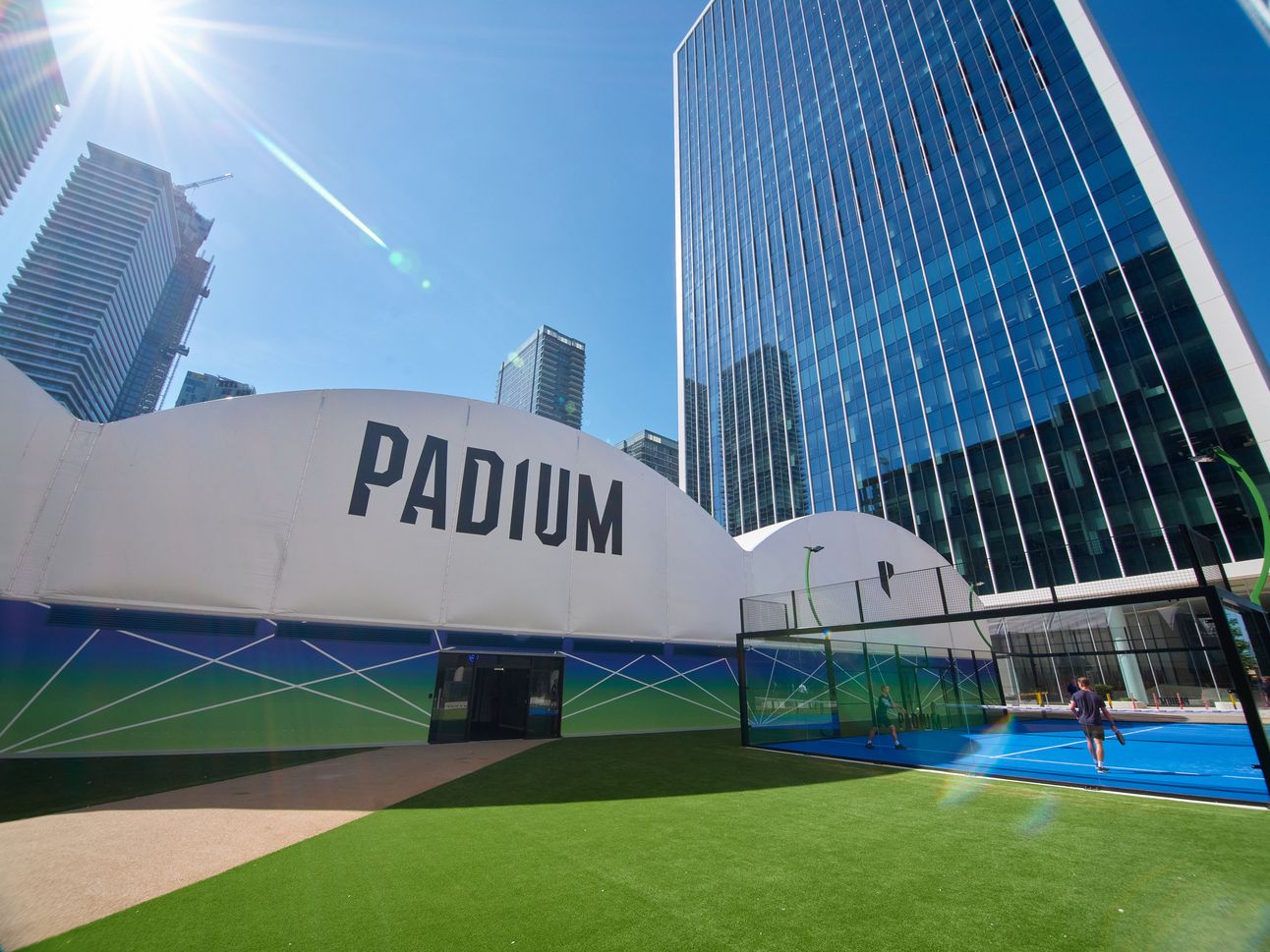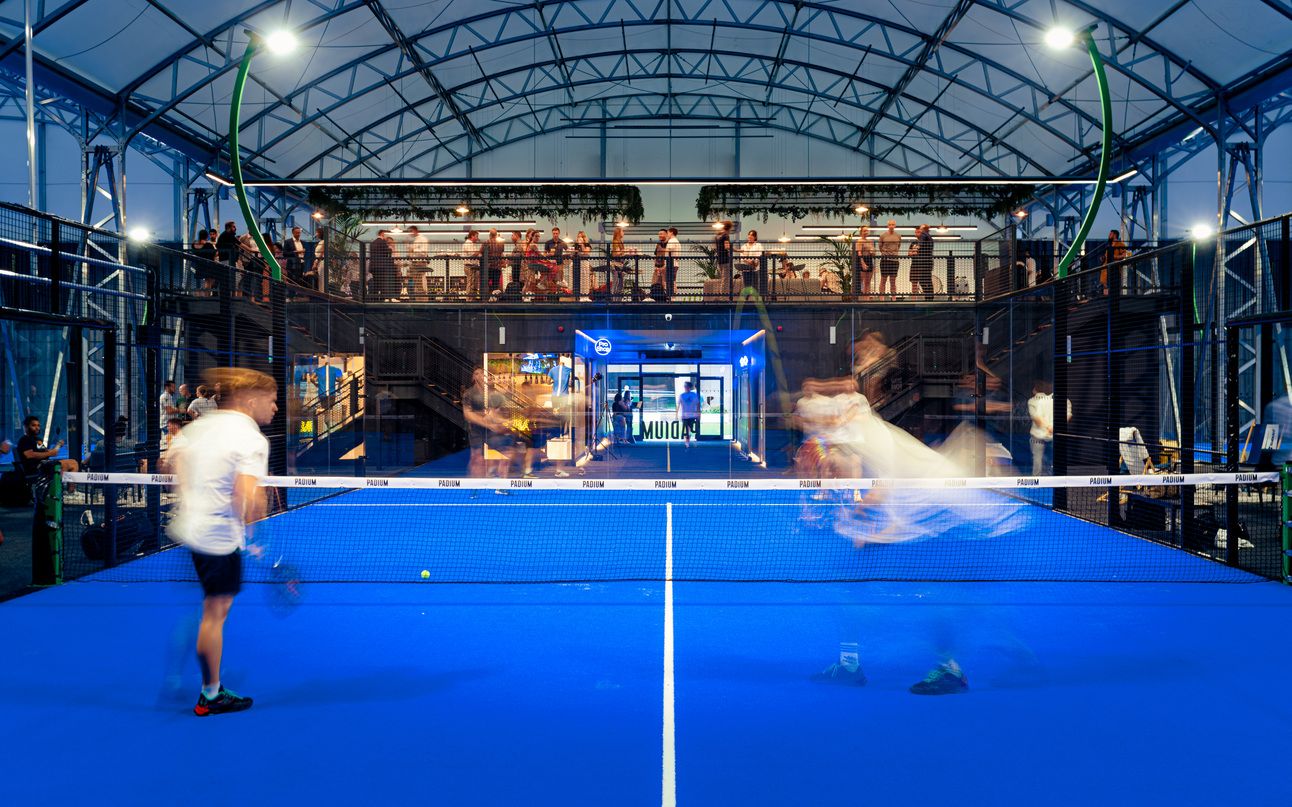- Padel Business Magazine
- Posts
- Houman Ashrafzadeh interview: Padium founder on what's next for London padel club with Spotify backer
Houman Ashrafzadeh interview: Padium founder on what's next for London padel club with Spotify backer
Careful consideration: Premium padel club in London’s Canary Wharf takes a discerning approach to opening new sites in the UK and US.
In an interview with Padel Business Magazine, Houman Ashrafzadeh – the Swedish entrepreneur behind the London premium padel club Padium, backed by Spotify co-founder Martin Lorentzon – shares details of the company’s plans for expansion, its commitment to high-end facilities, and how he views the rapid growth of padel in the UK.
Since opening its doors last August in London’s Canary Wharf, Padium has quickly come to be regarded by many as the English capital’s flagship padel club.
With seven indoor panoramic glass courts and two outdoor courts across a 30,000 square foot site, it was designed to replicate the premium experience of padel clubs in founder Houman Ashrafzadeh’s native Sweden.
Located close to Canary Wharf tube station, it features 10 metre-high ceilings, stylish changing rooms, a bar, space for networking and events and a shop selling racquets and Björn Borg clothing. It also offers coaching from British number 1 Jorge Martinez.
After moving to the UK to study, Ashrafzadeh began a career in banking before quitting to set up salad bar chain Urban Greens in July 2019. The Swede was inspired by the lack of healthy fast food compared to his home country, and the brand now has five locations across London – including Canary Wharf.
Ashrafzadeh’s move into padel was also driven by his experience in Sweden, where he fell in love with the sport while growing up. He was surprised at the lack of courts in Britain and wanted to set up his own club to help meet the growing demand across the country.
“Having spent half my life in Sweden and half my life in the UK, I've developed a way of seeing gaps in the market here and padel was one of those things,” he says, adding: “I tried to find investors here in the UK, but no one knew what padel was and no one was really supportive of the idea.”

Padium founder Houman Ashrafzadeh. Image credit: Padium.
Backing from Spotify co-founder Martin Lorentzon pivotal to opening
It was thanks to backing from Spotify co-founder and fellow Swede Martin Lorentzon that Ashrafzadeh’s vision became a reality. The pair are friends and business partners, with Lorentzon having also backed the direct-to-consumer coffee business Coffydoor set up by Ashrafzadeh in Sweden in 2020.
“Martin loves padel,” says Ashrafzadeh. “He plays it five, six times a week, he's really passionate about it. So to have someone like him with a passion and understanding of it and also deep pockets, he was the perfect business partner for me to have and gave Padium a lot of credibility.”
However, he admits that the entire project and Lorentzon’s backing nearly fell through amid difficulties getting it over the line, highlighting the challenges involved in such a venture. “I didn't have the money right up until the last second and Martin said he was thinking of pulling out. Luckily things worked out, but it was really difficult.”
Premium experience a priority amid Canary Wharf’s reinvention
Canary Wharf is home to skyscraper offices and some of the world’s biggest banking firms and since Covid it has been seeking to reinvent itself as a place “to work, live and play” with new leisure and entertainment facilities opening up.
Padium operates a pay-and-play model and since opening has had over 17,000 court bookings and reached over 12,000 customers.
Ashrafzadeh says from day one he wanted players to have a premium experience at the site. “I thought about it from my own perspective and the things I like when I go to a club or a gym. I love to be greeted as I come in, for example. And I'm obsessed with small details like even how the place smells. At Padium, we have designed it so players have this feeling of walking through a tunnel and out into an arena.”
Encouraging players to spend time at the site before and after their games has also been a key aim, for instance through setting up a big screen in the bar to show padel matches, as well as other sports such as tennis and football. “It’s all about helping create a sense of community where people can go and hang out and even just watch a game of padel,” he says.

Padium is located in the heart of London’s Canary Wharf. Image credit: Padium.
Taking a careful approach to expansion in the UK and US
Ashrafzadeh says Padium has big ambitions and is now looking to expand in the UK as well as the US, but stresses that it is taking a careful approach amid the rapid explosion in the sport’s popularity.
“My goal is to be the most premium but also the biggest padel brand in the UK. So that means I need to have the best sites in the country. We're looking to grow in London and other big cities in the UK – and also in the US. Our goal is to open our first club there early next year. We have made Americans know about who we are as a brand.”
He adds: “We have quite a few sites in our pipeline in the UK but we're also turning down quite a lot. I think some landlords see this as a good opportunity to take advantage of the padel craze and they are becoming slightly unrealistic with their terms.”
He warns that new entrants may suffer as a result. “I think a lot of inexperienced operators are just falling for the hype and are going to burn themselves quite badly. They're going to go and sign crazy deals just because they want to get into the game. I can see this is happening right now.
“It's not going to be as easy as they think it is, and they will then be sitting there with huge rents, business rates and service charges, and won’t even be able to earn anything back. So we're being selective and careful with where we go.”

Padium has seven indoor panoramic glass courts and two outdoor courts. Image credit: Padium.
Warning signs from overexpansion in Sweden
In Sweden, the padel industry has suffered from the effects of overexpansion after the market for courts boomed when padel rapidly transformed from a niche sport to a national obsession in 2020. New padel centres have since been forced to shut down due to too many of them opening at once, with Swedish media reporting on the “death of padel”.
The example of Sweden has been cited as a warning sign for countries such as the UK where padel is now growing rapidly, but Ashrafzadeh does not believe the sport in Britain will face challenges to that extent due to key differences between the two countries in how clubs can be set up.
“We can look at what happened in Sweden but I don't think it will get to that point in the UK because of the planning regulations,” he says. “It takes a long time, so it’s not as easy to expand as quickly as padel did there.”
For any new Padium clubs in the UK Ashrafzadeh envisages a lead time of around nine to ten months from the point of acquiring the site to opening. However, the development of the Canary Wharf facility took around 18 months “due to the complexity of the project”, he says.
The site was built on a scaffold lying in a basement prepared for the construction of a future skyscraper. “So we had to make a lot of engineering calculations to make sure that we could stand tall on that structure,” he explains.
For now, as Ashrafzadeh looks to build on Padium’s reputation and plans a bold expansion, all the work behind the opening of its first club appears to have been worthwhile.
Not yet a PBM subscriber? Sign up here for exclusive weekly insights into the padel industry, delivered directly to your inbox